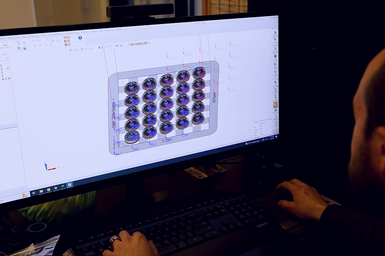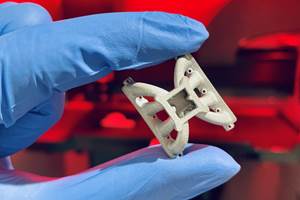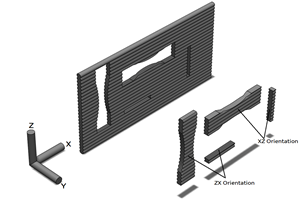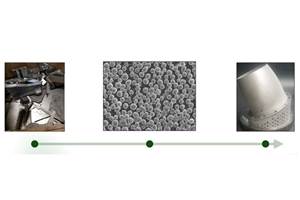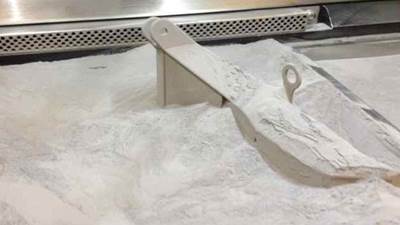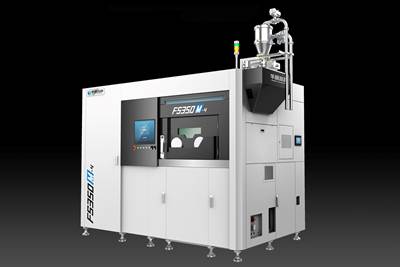MolyWorks Streamlines Production With 3D Systems’ Direct Metal Printing Solution
MolyWorks, a California-based developer of a circular economy for metal, has integrated 3D Systems’ DMP Flex 350 into its manufacturing workflow, enabling it to be more agile and efficient, and expand its customer base.
Share
Read Next
MolyWorks Director of AM, Devin Morrow, uses 3DXpert to accomplish build preparation, support generation and part slicing to help streamline its manufacturing process. Photo Credit: 3D Systems
MolyWorks, a California-based developer of a circular economy for metal, has integrated 3D Systems’ DMP Flex 350 into its manufacturing workflow. DMP Flex 350’s large print volume, vacuum chamber enables MolyWorks to be more agile and efficient than with a previous metal 3D printer.
As a result, MolyWorks says it has achieved significant efficiency improvements in its production process, and opportunities to enhance its breadth of capabilities by delivering additively manufactured end-use parts to its customers. With these advantages, MolyWorks has also grown its customer base, including the work the company is conducting alongside the U.S. Air Force to evaluate 3D-printed flight-critical parts.
The company says metal additive manufacturing (AM) has become a trusted technology to create airworthy parts with reduced weight and improved performance. With the ability to facilitate rapid design and production of consolidated components, AM helps accelerate the certification process and optimizes the entire supply chain.
As a producer of metal powder that is used to produce high-quality metal parts, MolyWorks needed an AM solution that seamlessly integrated with its workflow. It chose 3D Systems’ DMP Flex 350 due to its unique vacuum chamber architecture which is critical when manufacturing parts from titanium — a material that has become a standard alloy for aerospace applications. The vacuum chamber maintains a low oxygen environment (<25 ppm) which reduces argon gas consumption and produces an excellent surface finish with fine feature detail.
MolyWorks is also taking advantage of the DMP Flex 350’s optional removable print module (RPM). Being able to swap out the RPM enables its team to perform a quick cleanout and get the machine back up and running with another material in a short amount of time.
Additionally, the DMP Flex 350 includes Oqton’s 3DXpert software which supports every step of the AM workflow — from design to postprocessing — to quickly and efficiently transition from a 3D model to successfully printed parts. This single software solution for modeling, simulation and manufacturing eliminates the need to rely on multiple software packages. Efficiencies driven by 3DXpert can enable up to 75% faster file processing time and increase productivity by up to 40%, the company says.
“The high-value applications we are addressing with additive manufacturing require us to have a metal 3D printing solution that can maintain a very low internal oxygen level,” says Devin Morrow, director of AM, MolyWorks. “The DMP Flex 350, with its unique vacuum chamber, performs in a different class than competitive machines. The vacuum architecture reduces O2 levels to less than 25 ppm and delivers better chemistry control in finished parts and high levels of powder reuse. Being able to seamlessly transition from design and optimization in 3DXpert to production with the DMP Flex 350 has really helped us streamline our process.”
For rapid design or product iteration, Molywork’s founder Chris Eonta says 3D Systems’ DMP Flex 350 is unmatched. “Having this industry-leading solution in our facility is expanding our vision of what can be 3D printed in our processes,” Eonta adds. “We’re very impressed by the quality of the landing gear components we’re producing with this printer that will be tested for airworthiness, and are looking forward to the additional applications we will address.”
3D Systems’ Direct Metal Printing solutions are designed to deliver value in highly-regulated markets such as aerospace. “The combination of our industry-leading technology, Oqton’s software and our deep applications expertise enables us to help innovative companies like MolyWorks continue to push the boundaries,” says Dr. Michael Shepard, vice president, aerospace and defense segment, 3D Systems. I look forward to seeing how the MolyWorks team continues to realize the benefits of the DMP Flex 350, and the future opportunities for growth we can explore.”
- Read about how MolyWorks is future-proofing the circular economy for metals with small-footprint atomization technology that converts metal scrap into additive manufacturing powder on the spot.
- Learn more about California-based MolyWorks as it ships its second small-footprint powder production unit to Singapore, bringing sustainable material production to Asia.
- Here is an article detailing how 3D Systems helped TE Connectivity to additively manufacture electrical connectors. The foundation of the solution is a newly developed photopolymer 3D Systems engineered specifically to meet TE Connectivity’s requirements.
Related Content
Sustainable Furniture Company Model No. Maintains Product Focus with Switch from DIY to Industrial 3D Printers
The startup founded in 2018 has matured in its product offerings as well as its manufacturing equipment, moving from homegrown 3D printers to industrial large-format machines.
Read MoreIncus Successfully Tests Lithography-Based Metal Manufacturing for Lunar Environment
The project aim was to develop a sustainable process that uses lunar resources and recycled scrap metals (eventually contaminated by lunar dust) to produce spare parts on-site which could help and enhance human settlement on the moon.
Read MoreEvaluating the Printability and Mechanical Properties of LFAM Regrind
A study conducted by SABIC and Local Motors identified potential for the reuse of scrap reinforced polymer from large-format additive manufacturing. As this method increases in popularity, sustainable practices for recycling excess materials is a burgeoning concern.
Read MoreSustainability in Additive Manufacturing Is a Moving Target: AM Radio #37
Assessing 3D printing as a sustainable manufacturing method is a complex problem. Dr. Tim Simpson and Stephanie Hendrixson discuss current research and future opportunities on AM Radio.
Read MoreRead Next
Profilometry-Based Indentation Plastometry (PIP) as an Alternative to Standard Tensile Testing
UK-based Plastometrex offers a benchtop testing device utilizing PIP to quickly and easily analyze the yield strength, tensile strength and uniform elongation of samples and even printed parts. The solution is particularly useful for additive manufacturing.
Read MorePostprocessing Steps and Costs for Metal 3D Printing
When your metal part is done 3D printing, you just pull it out of the machine and start using it, right? Not exactly.
Read MoreBike Manufacturer Uses Additive Manufacturing to Create Lighter, More Complex, Customized Parts
Titanium bike frame manufacturer Hanglun Technology mixes precision casting with 3D printing to create bikes that offer increased speed and reduced turbulence during long-distance rides, offering a smoother, faster and more efficient cycling experience.
Read More




